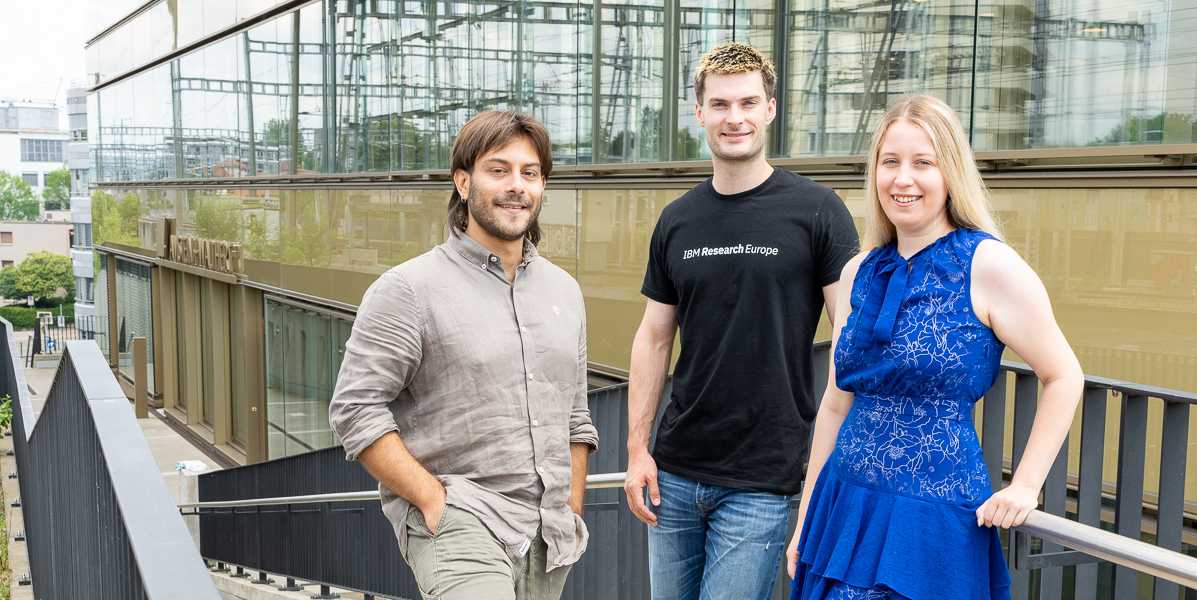Igniting the next wave of scientific breakthroughs
IBM Research and ETH AI Center are joining forces to build next-gen AI algorithms for science. Their Discovery Accelerator Hub blends academic depth with industry tools, empowering PhD fellows to tackle real-world challenges—from physics to cybersecurity.

Now in its second year, the partnership between ETH Zurich’s AI Center and IBM Research Europe – Zurich is gaining momentum in advancing AI algorithms that will power the next scientific revolution. Launched in January 2024, the ETH–IBM Discovery Accelerator Hub brings together IBM’s legacy in AI, quantum and high-performance computing technologies with ETH Zurich’s academic excellence. Its mission: to develop and deploy the foundational AI algorithms that will expand the frontiers of science, well beyond today’s single‑domain applications, tackling challenges ranging from solving ODE/PDEs and large‑scale optimization problems to modeling complex time‑series events.
Joint Mentorship: Bridging Academia and Industry
The ETH–IBM Fellowship Programme supports up to twelve exceptional doctoral students, each mentored jointly by experts from IBM Research and the ETH AI Center. This co-mentorship structure enables a truly interdisciplinary approach while strengthening the collaboration between ETH academics and IBM researchers worldwide. Fellows gain direct access to real-world industry datasets and high-performance computing, along with IBM’s state-of-the-art toolchains, empowering them to move beyond incremental advances and engineer new algorithmic building blocks for science.
Research Advancements by Current Fellows
“The collaboration between ETH Zurich and IBM Research has broadened my perspective and deepened my understanding of the greater relevance of my work”, says Levi Lingsch, who started his doctorate under the supervision of Professors Siddhartha Mishra and Sebastian Schemm (ETH), and Dr. Thomas Brunschwiler (IBM) in late 2024. “This experience has helped me to see how my research can create value beyond academia, informing both scientific inquiry and practical applications in industry. It goes beyond shaping my work, encouraging me to ask more interdisciplinary questions and consider the real-world impact from the outset.”
Lingsch’s work could one day help predict local weather events more accurately, understand the behaviour of plasma in fusion reactors, or design the next generation of transportation. To get there, he is developing tokenization schemes for partial differential equations to efficiently manage large-scale scientific models. His research addresses limitations in conventional tokenizers built for images by capturing fine-grained details critical to resolving data that describes the physics of fluid dynamics or weather patterns. By merging symbolic mathematics with large-scale scientific data and AI models, his research lays the foundation for models capable of generalising across diverse domains in science and engineering.
Kristina Nikolic, who started her doctorate under the supervision of Prof. Florian Tramer (ETH) and Dr. Beat Buesser (IBM) in late 2024, is addressing an entirely different challenge: advancing the responsible and secure deployment of AI technologies across industry applications. Her work challenges conventional methods for evaluating jailbreak attacks by introducing a new metric: JailbreakTax, which quantifies the practical utility of jailbreaks. Her findings reveal that many successful jailbreaks come at the cost of model performance, reshaping how risks are understood. Looking ahead, she will expand her focus to securing autonomous AI agents and exploring the intersection of AI and cybersecurity, continuing her mission to build safer, more trustworthy AI systems. “ETH and IBM Research create a unique environment where advanced research in AI safety and trustworthiness is directly intertwined with industrial applications, encouraging collaboration across disciplines,” she says. “It helped me uncover exciting synergies between LLM, cryptography, and cybersecurity—opening up promising avenues for future collaboration.”
Starting in 2025, Orestis Oikonomou will begin his doctoral research on physics-informed neural networks and neural operators, supervised by Professors Siddartha Mishra and Eleni Chatzi (ETH), and Dr. Cristiano Malossi (IBM). His work will focus on simulating aerodynamic flow around complex geometries, such as those found in high-performance racing cars, with the goal of pushing the limits of algorithmic efficiency for complex physical systems.
Continuing to Lead: Academic-Industry Collaboration Excellence
This partnership has fostered close collaboration between IBM researchers and ETH faculty and fellows, jointly advancing the development and application of AI methods in scientific research across disciplines.
IBM continues to set the agenda for transformative AI research, convinced that discovery accelerates with the creation of universal methods. Looking ahead, it will deepen the exploration of novel algorithms in AI and also on potential synergies with quantum computing, investing in foundational algorithms that scientists across disciplines can rely on for decades.
To explore how your company could become a Fellowship Partner, please contact or visit our Fellowship Partner page.
To learn more about the Fellowship Programme and its application process, visit our Fellowship Programs page. Note: Applications for 2026 will be accepted in Oct 2025.
Stay informed about future opportunities—subscribe to our newsletter here.